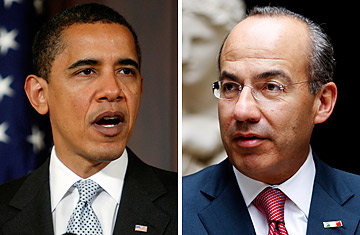
U.S. President Barack Obama, left, and Mexican President Felipe Calderón
When U.S. President Obama stops off in Mexico on Thursday on his way to the annual Summit of the Americas, he will be visiting a nation that is in the news — and not in a good way. The war that Mexican President Felipe Calderón has waged against his nation's drug cartels has predictably been marked by horrible violence. Washington analysts, watching the mayhem in some Mexican towns as cartels settle old scores, fight turf wars and take the fight to overmanned (and all too often, deeply compromised) police forces, have compared Mexico to failed or failing states like Pakistan. (See pictures of fighting crime in Mexico City.)
There is little that is surprising about this. It has long been Mexico's fate to make it onto the front pages of U.S. newspapers only when the news from there is bad. Pessimists could add to the drug wars the parlous state of the Mexican economy — dragged down, as it is, by its close ties to that of the U.S. Alfredo Coutino of the Dismal Scientist projected this week that Mexico could contract by 4% to 5% this year, maybe more, which would put its recession in the same bottom tier as other hard-hit economies such as the U.K. and Japan, and rival that seen during Mexico's "tequila crisis" in 1995. (Read a brief history of the U.S.'s war on drugs.)
All of which, Obama's advisers should tell him, is beside the point. As Andres Martinez points out in an essay in Slate, Mexico and the U.S. are "fortunate to border each other." The 2,000-mile-long frontier between the two nations — each with very different economic histories, traditions and standards of living — is remarkably peaceful, and has been for more than a century and a half. O.K., the U.S.-Mexico border is not Scandinavian-placid like the 49th parallel, but by comparison with pairs seen elsewhere in the world, Mexico and the U.S. are pretty good neighbors.
If Obama is wise, he will reflect not on Mexico's challenges, real as they are, but on what extraordinary strides the nation has made in the last quarter of a century. At the time of the Mexico City earthquake in 1985, Mexico's political system had ossified into an elective dictatorship, in which power was held by the Institutional Revolutionary Party (PRI) for a staggering half-century. The economy has always had real challenges, like a difficult geography, with lots of desert and few navigable rivers. The long impoverishment of the Indian population blighted the whole nation's economic prospects. Despite all this, Mexico's economy has always had vast potential, but during the PRI ascendancy, the nation was closed off from world trade, in thrall to discredited theories of import substitution.
The earthquake shook up more than the capital city. It exposed the corrupt political system and gave heart to a remarkably talented (if occasionally arrogant) set of technocrats. Forgiving the mid-1990s, when the peso had to be rescued by the Clinton Administration, the Mexican economy has shown great resilience in the past 20 years as Mexico oriented itself to the outside world, joined the World Trade Organization and signed the North American Free Trade Agreement with the U.S. and Canada. Even in the first years of this decade, when the shift of global manufacturing to China threatened to derail Mexican progress, the economy held its own. Politically, the election of the conservative Vicente Fox as President in 2000 — a mere 12 years after the PRI almost certainly stole the presidency from Cuauhtémoc Cárdenas, the candidate of the left — marked a decisive break with the past and signaled that Mexico had become a mature democracy.
Mexico is not perfect, God knows, but what country is? The political and economic progress it has made compares well with that of nations that are frequently held up as exemplars of modernization. In development stars such as South Korea and Thailand, political convulsions have demonstrated that economic growth on its own does not make for prosperity and stability. To be sure, Mexico has not seen the modernization on all fronts that Spain experienced in the years after the end of Franco's dictatorship, but Spain's progress was much helped by the country's early accession to the European Union, with all the real and symbolic benefits that flow from it. The U.S. is never going to offer Mexico the sort of benefits — the free movement of labor, aid with infrastructure development and a common external trade policy — that E.U. member states enjoy. And Mexico, with an always prickly sense of its sovereignty, would never submit to the supranational supervision of its policies to which E.U. nations agree.
On its own terms, by comparison with that of other middle-income nations, and notwithstanding policies by its neighbor to the north that are often less than helpful (the free movement of assault rifles?), Mexico's story is one of the world's more encouraging ones over the past 20 years. You won't read that on the front pages of U.S. newspapers during Obama's brief trip, but you should.
